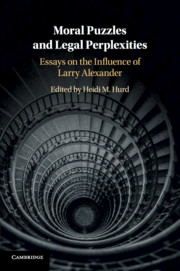Book contents
- Moral Puzzles and Legal Perplexities
- Moral Puzzles and Legal Perplexities
- Copyright page
- Dedication
- Contents
- Figures
- Contributors
- Acknowledgments
- 1 Introduction
- Part I Puzzles in Criminal Law
- Part II Problems in Constitutional Law
- 7 Justifying Academic Freedom
- 8 Vindicating Judicial Supremacy
- 9 Alexander’s “Simple-Minded Originalism”
- 10 Subjective versus Objective Intentionalism in Legal Interpretation
- 11 Simple-Minded Originalism? Simply Wrong!
- 12 Intentions in Tension
- 13 Alexander’s ConstitutionalismA Qualified Defense
- Part III Perplexities in Jurisprudence
- Part IV Paradoxes in Moral Philosophy
- Bibliography of Works by Larry Alexander
- Index
13 - Alexander’s ConstitutionalismA Qualified Defense
from Part II - Problems in Constitutional Law
Published online by Cambridge University Press: 02 November 2018
- Moral Puzzles and Legal Perplexities
- Moral Puzzles and Legal Perplexities
- Copyright page
- Dedication
- Contents
- Figures
- Contributors
- Acknowledgments
- 1 Introduction
- Part I Puzzles in Criminal Law
- Part II Problems in Constitutional Law
- 7 Justifying Academic Freedom
- 8 Vindicating Judicial Supremacy
- 9 Alexander’s “Simple-Minded Originalism”
- 10 Subjective versus Objective Intentionalism in Legal Interpretation
- 11 Simple-Minded Originalism? Simply Wrong!
- 12 Intentions in Tension
- 13 Alexander’s ConstitutionalismA Qualified Defense
- Part III Perplexities in Jurisprudence
- Part IV Paradoxes in Moral Philosophy
- Bibliography of Works by Larry Alexander
- Index
Summary
- Type
- Chapter
- Information
- Moral Puzzles and Legal PerplexitiesEssays on the Influence of Larry Alexander, pp. 221 - 238Publisher: Cambridge University PressPrint publication year: 2018

